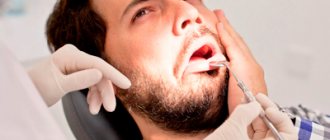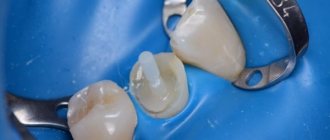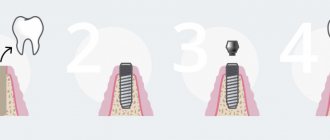Sanitation of the oral cavity is a rather important event, which, unfortunately, is underestimated by many. Although this procedure helps to promptly identify problems with teeth and gums and effectively eliminate them in the early stages. Sanitation can be planned (preventive), or prescribed in connection with other events. A certificate of oral hygiene may be needed in many situations. For example, it is necessary for pregnant women or people who are preparing for surgery.
For pregnant
In order to avoid problems with teeth and gums during pregnancy, it is necessary to take care of your dental health even before pregnancy, at the planning stage. If everything necessary to eliminate existing dental problems is carried out in a timely manner, the development of concomitant pathologies can be minimized. Some of the most common oral problems experienced by pregnant women include:
- Development of caries due to disturbances in the acid-base balance.
- Weakening of the protective properties of tooth enamel due to changes in the mineral composition of saliva.
- Deterioration of enamel due to loss of calcium.
- The development of gingivitis as a consequence of changes in hormonal levels.
In modern dental clinics, sanitation of the oral cavity in pregnant women is carried out extremely carefully in order to minimize possible risks. For a safe and successful outcome of this procedure during pregnancy, the dentist needs to know the current stage of pregnancy. This is important for the selection of therapeutic manipulations during this period. If there is an urgent need for tooth extraction, it is best to carry out this and other dental procedures in the second trimester, since it is during this period that the effect of medications on the fetus is minimal. After the examination, the specialist will give recommendations on the selection of individual hygiene products to maintain the oral cavity at a normal level. In case of inevitable tooth extraction, or treatment of advanced forms of caries, manipulations will be carried out using anesthesia, which is permitted during pregnancy. A conclusion on the sanitation of the oral cavity is required by a gynecologist during registration and before childbirth in order to eliminate possible risks of infection of internal organs and systems. Calcium deficiency, altered composition of saliva and hormonal disruptions in the body of a pregnant woman - all this makes teeth fragile, which is why they quickly decay. The presence of infections in the oral cavity is dangerous not only for the health of the expectant mother, but also for the baby. In this regard, the reorganization procedure is necessary.
Prices
Complete sanitation of the oral cavity, as a rule, takes place in several stages (2-3 visits). Average prices for basic procedures:
- ultrasonic teeth cleaning (tartar removal) – from 4,000 rubles;
- abrasive cleaning using the Air Flow method (removing “smoker’s” deposits) – 4,300 rubles;
- tooth filling of the 1st degree of complexity (initial caries) – 2000 rubles;
- filling for deep caries – 2800 rubles;
- treatment of gingivitis/periodontitis (cleaning gum pockets, treatment with medicine) – from 6,500 rubles;
- simple tooth extraction (without cutting the gums) – 1200 rubles;
- complex wisdom tooth removal – about 5,000 rubles.
Already at the first examination, the doctor will draw up an action plan and determine what procedures are necessary in your particular case. If you are looking for dentistry with affordable prices, we recommend using the search engine on our website. She will help you find a clinic near your home or place of work.
For children and teenagers
Sanitation at the dentist is a mandatory event for children of preschool and school age; this procedure may also be required for students. The child will need a certificate of rehabilitation when registering for kindergarten, and then for school. During the sanitization process, a specialist can identify and voice all existing problems, as well as give recommendations on proper individual hygiene of teeth and gums. When sanitation of the mouth, the doctor may:
- Detect the initial stages of development of carious processes.
- If necessary, treat the affected teeth.
- If malocclusion is detected, give recommendations for orthodontic treatment.
- Carry out fluoridation of teeth to prevent the development of diseases.
A dental examination is required due to the thinness and weakening of children's enamel. It is most susceptible to destruction, so it is important to promptly detect problems and carry out the necessary treatment. Before school and upon admission to universities, it is necessary to undergo a medical examination, which may include a visit to the dental office.
What is oral sanitation?
Full mouth sanitation includes the following procedures:
- examination of the oral cavity;
- removal of dental plaque (pigmented plaque and tartar) - carried out by ultrasonic or abrasive cleaning;
- filling of all carious lesions;
- treatment of detected diseases (pulpitis, periodontitis, etc.);
- elimination of damaged teeth and dental roots that cannot be restored;
- anti-inflammatory therapy of the mucous membrane (for gingivitis, stomatitis, periodontitis);
- in the absence of one or more teeth - prosthetics;
- removal of problematic “eights”;
- if necessary, bite correction.
Types of sanitation:
- individual (one-time) – when the patient applies independently (optional);
- planned (therapeutic and preventive) - carried out for workers of industrial enterprises, as well as in schools and other educational institutions.
Before surgery
To eliminate the risk of infection during surgical interventions, it is important to undergo sanitation with a dentist before the operation, which is part of the preparatory process. During sanitation, the dentist must examine the patient’s oral cavity to exclude the presence of an inflammatory process in the periodontal tissues and carious lesions. A certificate from a dentist is required before scheduled non-oral surgery, such as ophthalmological, cosmetic, gastroenterological and other operations. This procedure is necessary to prevent infection of other organs. If emergency intervention is required, the patient will not be referred to a dentist.
How teeth and gums are prepared for extraction, prosthetics or implantation
Like any other operation, tooth extraction, installation of dentures or implants requires careful preparation. Therapeutic preparation of the oral cavity for further manipulations - prosthetics, installation of braces or implantation, includes:
- Initial examination and appointment of all necessary studies (X-ray, CT scan possible, clinical tests, etc.)
- Sanitation of the mouth. At this stage, all foci of inflammation are identified and eliminated, caries and its complications are treated, and the health of the gums and mucous membrane is restored. If necessary, depulpation of abutment teeth can be performed before prosthetics. All manipulations in our clinic are carried out in accordance with international protocols - using sterile disposable instruments and a dental dam to isolate teeth.
- Professional teeth cleaning - removal of subgingival and supragingival stones, followed by polishing and fluoridation.
The last point is no less important than correct diagnosis and treatment of teeth or gums. Because as a result, it is the removal of stone that helps relieve excess inflammation of the gums, reduce bad breath and prevent negative consequences that may interfere with maintaining oral health after any dental procedures.
How to get a certificate
To do this, you should make an appointment at the dental clinic. After the examination, the dentist will tell you about the current state of the oral cavity and issue an appropriate medical document certified by a personal signature and seal of the institution. Sanitation of the oral cavity is an important measure that is required in many situations. A certificate from a dentist will be required during pregnancy and before childbirth, when entering kindergarten, school, universities, and also before surgery. The main task of sanitation is to identify dental problems. If they are detected, the doctor must prescribe the necessary treatment.
Sanitation of the child’s oral cavity
Indicated for children of school and preschool age, as well as adolescents. Regular examinations are carried out in kindergartens (from the age of 3), schools, sanatoriums, and boarding schools.
You can also contact a dentist at a children's clinic near your place of residence. If necessary, the doctor will give the child a hyena lesson and show how to use a toothbrush and floss correctly. Children's baby teeth deteriorate faster because their enamel is thin and weak. Therefore, it is recommended to carry out monitoring 2-3 times a year.
Even if your child wears braces, it is still important to make preventive visits and remove accumulated bacterial plaque every 4-6 months.
Certificate from the dentist
Review of “Free-form doctor’s certificate”
Probably everyone has situations when they need to escape from work under a plausible pretext. So I had the same situation: friends invited me to an anniversary in another city. In general, run away n..
Review of “Certificate from physical education to school”
I was in 11th grade and at the football academy I had a hard joint and my meniscus was injured. For a very long time I tried to improve my physical condition and for this reason I decided that I didn’t need to move...
Review of “Vaccination certificate”
I have never had vaccinations because I don't trust their quality. But a certificate of vaccination was required. Ordered using this site. They issued a certificate promptly and delivered it the next day.
Review of “Medical certificate for traffic police in the Regions”
I passed my license not so long ago. It seemed half the job was done, but when it came to the medical examination, I realized that passing the license itself is not so difficult. I work every other day, so one day is off..
Order a certificate from a dentist
– Registration within an hour
– Seals and signatures of active doctors
– We are in touch 24/7
Certificate price: 900 rub.
– + Buy Ask a question
A visit to the dentist is accompanied by the need to miss part of the work day or classes at school or university. A document confirming a valid reason for absence is a certificate from a dentist. Here the patient’s personal data is indicated, as well as the date and purpose of the visit. Examples of reasons to visit a dental office are tooth treatment/extraction, oral sanitation. The latter procedure is often formal, caused by the need to obtain medical certificates.
When might a certificate be needed?
Oral sanitation is a procedure that absolutely everyone, young and old, undergoes. Therefore, it can be requested for various purposes.
- Pregnancy. The antenatal clinic must refer you for examination to a dentist upon registration. This is done in order to prevent many unpleasant consequences that can happen to the oral cavity during pregnancy due to changes in hormonal levels.
- Help before childbirth. I send the woman to the maternity hospital, the local gynecologist who managed the pregnancy again sends the patient for sanitation.
- Without this certificate, the child will not be accepted into any educational institution, from preschool to higher and vocational.
- Those who are about to have a planned operation will also have to visit the dentist to get the coveted opinion.
- An annual medical examination is also not complete without a dentist’s note.
- People who work in some kind of hazardous environment or in production where dental pathologies can develop. In other words, all employees of chemical plants, as well as in confectionery shops, must be regularly examined by a dentist.











